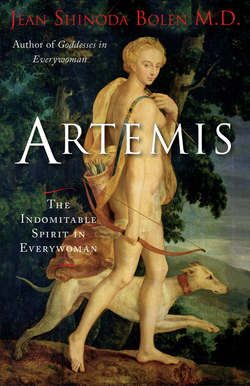Читать книгу Artemis - Jean Shinoda Bolen - Страница 9
На сайте Литреса книга снята с продажи.
Atalanta and Artemis
ОглавлениеAtalanta is a famous hunter and runner in the ancient Greek myth of a mortal woman, who was rejected and left to die when she was born. She survived, the ancient storytellers said, because she was “under the protection of Artemis.” Atalanta exemplifies the indomitable spirit in competent, courageous girls and in the women they become. This indomitable spirit refuses to give up on what she knows to be true for herself. These women have grit and the passion and persistence to go the distance, to survive and win.
Girls and women with indomitable spirit are the new protagonists in many of the most-read novels and fictional series of this century. They have emerged in the creative process of authors with a reality that seems to blend invention and active imagination. I believe that these emerging female heroes are captivating readers because of a morphic resonance. Energies and archetypal patterns in the collective unconscious are rising into our individual consciousness and changing assumptions about women and in women.
Katniss Everdeen is an Atalanta in Suzanne Collins' The Hunger Games trilogy; Lisbeth Salander is a darker side of this same spirit in Steig Larsson's The Girl with the Dragon Tattoo. I also see Atalanta in Anastasia Steele, the main character in E. L. James' Fifty Shades of Grey who ventured into the wilderness of emotion and sexuality. These are young women who call upon their intuition, depth of feeling, and courage to go beyond previous limits; who feel fear and outrage and have to adapt and endure and not give in or give up. Each has an inner spirit that is not subdued, a will that is not broken. Each in her own way is a quirky, independent, courageous person who is in uncharted territory—the metaphoric wilderness, the realm of Artemis.
Until the Women's Movement in the 1960s, the enduring fictional character with Atalanta qualities was independent-thinking, hot-tempered tomboy Jo from Louisa May Alcott's Little Women. Jo is the one sister in the March family who pursues a career and who, when she finally does marry, makes a conscious, personally meaningful choice. In novels, as in real life, it's not what happens to us that counts, but how we respond.
In Greek mythology, Atalanta the mortal and Artemis the goddess have similar sounding names and qualities. Artemis is the goddess with the silver bow and arrows, the hunter with unerring aim. Atalanta is also a renowned hunter. Like Artemis, she is at home in forests and associated with animals, the mother bear in particular. But Atalanta is mortal and, as such, can be affected by Artemis or any of the other divinities in the Greek pantheon. She can also suffer the consequences of being a woman in the cradle of patriarchy.
In the age of feminism, Atalanta became known to several generations of children through Marlo Thomas' Free to Be . . . You and Me, which entered the popular culture as a book, as a recording, and then as a television special. The book became a children's classic. In this version of the mythic tale, the Princess Atalanta is an athlete and astronomer who promises her father that she will marry the man who can beat her in a footrace. Atalanta has also been featured as a hunter and a runner in videogames, in comic books, and on television. She even became a toy action figure following her role as a strong character in the video series Hercules: The Legendary Journeys.
